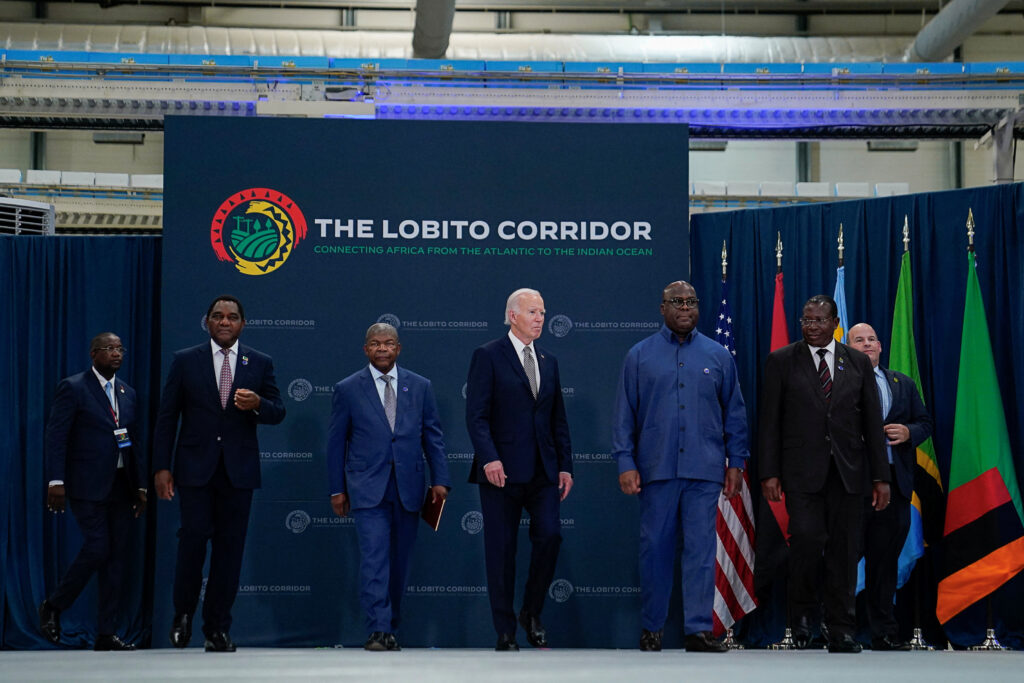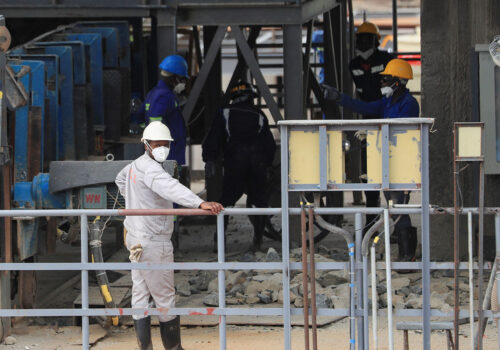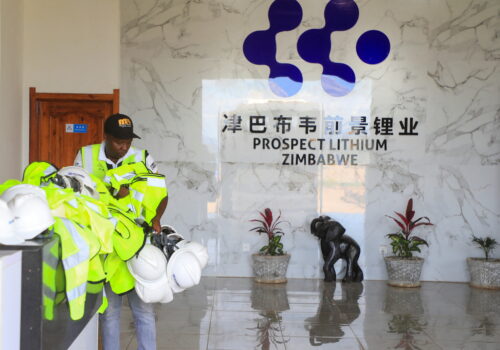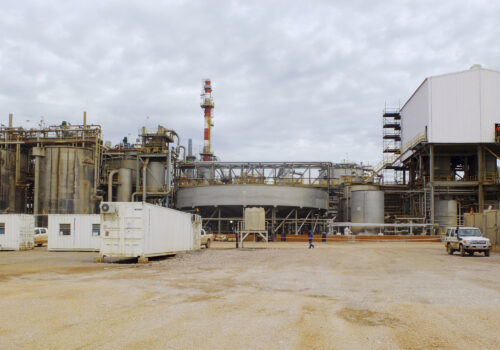During his early December visit to Angola, US President Joe Biden pledged an additional $600 million to the Lobito Corridor project—an ambitious, US-backed infrastructure initiative linking the port of Lobito on Angola’s Atlantic coast to Zambia through the Democratic Republic of the Congo (DRC). This increased investment brings the United States’ commitment to the project to four billion dollars and the total investment by all key players to six billion dollars.
This pledge reflects the United States’ heightened focus on securing supply chains for critical minerals, resources that play a pivotal role in the development of technologies from electric vehicles to solar panels to defense systems.
But Biden’s visit to Angola also underscores a bigger shift for the United States: both in its engagement with African nations and in its approach to the geopolitical competition for critical minerals unfolding in Africa. The Lobito Corridor exemplifies an approach to US engagement with Africa that prioritizes collaborative and equitable partnerships over exploitative models.
A new engagement strategy with Africa
The Lobito Corridor project is the United States’ largest effort to counter China’s presence in Africa.
China went on a notable buying and investment spree—solidifying its footprint in Africa’s mining sector by the early 2000s, particularly in the Copperbelt region in Central Africa. China owns or has a stake in fifteen of the DRC’s nineteen cobalt mines and has also made substantial investments in lithium production in Zimbabwe, giving China a significant advantage in the production of batteries and renewable energy technologies. Since China launched the Belt and Road Initiative (BRI) in 2013, Beijing has established significant economic inroads in many African nations through investments in transportation, infrastructure, and energy.
While US interest in African mining slowed for decades, the United States is increasingly working with and investing in African countries to develop the continent’s vast mineral resources.
In 2022, the Biden administration and several partner countries, along with the European Commission, launched the Minerals Security Partnership (MSP). This partnership aims to develop sustainable, transparent, and secure supply chains for critical minerals, with an emphasis on environmental, social, and governance standards.
Then in May 2023, the Group of Seven’s (G7’s) Partnership for Global Infrastructure and Investment (PGII) took up the Lobito Corridor project; in September of that year, the United States and the European Union announced that they would be co-leading the project. The proposed rail project involves the construction of approximately 350 miles of new rail line in Zambia that will connect its northwest region to the southern part of the DRC. This line will ultimately link to track in Angola and grant Zambia access to the Atlantic Ocean. The project also entails constructing hundreds of miles of feeder roads along the corridor and renovating the 120-year-old Benguela railway.
When completed, the Lobito Corridor will provide greater access to the global market for these critical mineral-rich economies by expanding export possibilities, boosting regional trade, and reducing the time it takes to transport minerals and other goods. Its construction will advance the United States’ economic interests by unlocking investment opportunities, thereby creating avenues for US businesses to diversify supply chains, establish partnerships, and contribute to the economic diversification of the region—as well as offer African countries a more collaborative and transparent alternative to the BRI. Additionally, the corridor will help facilitate westward trade flows of critical minerals needed for the energy transition via the Atlantic, whereas previously many mineral exports have tended to flow eastward for export out of Tanzania’s Dar es Salaam port.
Overall, the United States’ increasing work with and investment in Africa, particularly through the Lobito Corridor and the MSP, demonstrates a US commitment to fostering infrastructure that supports shared economic growth and strives for more equitable access to resources.
Who is involved in this ambitious infrastructure project?
The PGII’s Lobito Corridor project stems from the Lobito Corridor Transit Transport Facilitation Agency Agreement, which was signed by the governments of Zambia, Angola, and the DRC in January 2023 to advance the growth of domestic and cross-border trade along the Lobito Corridor. Then solely a regional effort, its development has been bolstered by international cooperation with the United States, the European Commission, the African Development Bank (AfDB), and the Africa Finance Corporation (AFC).
In October 2023, the United States signed a memorandum of understanding (MOU) with Zambia, Angola, the DRC, and the European Commission to kickstart the project. The MOU named the AFC as the lead developer of the rail line, and the AfDB also signed on—contributing $500 million and committing to help raise $1.6 billion in additional financing.
In February 2024, more than 250 business and government leaders from the DRC, Angola, Zambia, the European Union, and the United States—together with international investors and industry leaders—convened at the PGII Lobito Corridor Private Sector Investor Forum in the Zambian capital of Lusaka. This forum highlighted the importance of public-private partnerships for the project. These kinds of partnerships have the potential to foster mutual prosperity for US investors and African economies. Additional funding commitments to the Lobito Corridor project were made at the gathering. Perhaps most notably, the US International Development Finance Corporation (DFC) announced a $250 million loan to the AFC to help support its efforts to develop and strengthen infrastructure across the African continent.
Most recently, at the 2024 United Nations Climate Change Conference (COP29) in Baku, Azerbaijan, in November, the DFC’s board approved a loan of up to $553 million to the Lobito Atlantic Railway in Angola for the upgrades and rehabilitation needed to help make the transport of critical minerals more reliable. The DFC also committed $3.4 million in technical assistance to Pensana—a rare-earths processing hub located in the United Kingdom—to explore the possibility of a rare-earth mine and refining facility in the Lobito Corridor.
The Lobito Corridor project today
Within eighteen months of the United States’ initial commitment in September 2023, PGII partners had already allocated more than three billion dollars to advancing the Lobito Corridor, including investments in diverse sectors such as clean energy, transportation and logistics, agriculture, healthcare, and digital infrastructure. By leveraging both public and private financing—and committing to anti-corruption, transparency, and good governance—the Lobito Corridor project is designed to create employment opportunities, facilitate regional and global trade, and spur investments in clean energy, as well as agriculture, digital connectivity, and food security.
This significant investment has already catalyzed additional developments. In September, the AFC signed concession agreements with Angola and Zambia to support the railway project. The AFC was also awarded two million dollars in grant funding by the US Trade and Development Agency to complete the preliminary environmental and social studies for the project and ensure that the Lobito railway aligns with environmental standards and international best practices. These agreements lay the foundation for the subsequent, more ambitious phases of the project centered around rail lines that connect Angola to the DRC and extend the corridor into Zambia.
A model for future investment in Africa
The Lobito Corridor project underscores a growing recognition of Africa’s pivotal role in the global energy transition and marks a notable shift in how the United States engages with the continent.
The new model offered by the Lobito Corridor’s funding structure—which relies on a mix of public-private partnerships, grants, and concessional financing—differs significantly from state-led investments in infrastructure through China’s BRI, which has often drawn criticism for saddling African nations with unsustainable debt through opaque and unaffordable loan agreements. The Lobito Corridor, by contrast, is designed to minimize financial risk to participating African nations.
But the opportunity to lean into this shift in how the United States works with Africa could be missed once the new US administration and Congress take office in January 2025. President-elect Donald Trump’s policy record would suggest a more transactional approach to critical minerals development and infrastructure investment, with less focus on multilateral cooperation. In contrast, the Biden administration has emphasized partnerships with African governments and international bodies. But there is a chance that Trump might pursue more bold infrastructure projects like the Lobito Corridor, albeit with a stronger emphasis on advancing the United States’ strategic priorities, in line with his heavy emphasis on “America first” policies and his transactional approach to trade relationships.
The Lobito Corridor’s success depends on several factors, chief among them equity in partnerships, transparency, and the outcomes of the broader geopolitical dynamics at play. But if effectively implemented, the project could demonstrate the possibility of successful development strategies that promote collaboration, sustainability, and mutually beneficial outcomes—and thus redefine how the United States and other international actors engage in Africa.
Sarah Way is a graduate of the University of Colorado Boulder’s International Affairs Program with a specialization in Africa and the Middle East. Her research centers on the intersection of natural resources and development, with a specific focus on extractive minerals in Africa.
Further reading
Tue, Nov 26, 2024
The US won’t gain a lead in the competition for Africa’s critical minerals without innovation
AfricaSource By
If the United States wants to differentiate itself from competitors in the critical mineral sector, it will need to form partnerships with African countries that are economically feasible, environmentally sustainable, and ethical.
Mon, Sep 9, 2024
The strategies driving the players in competition for Africa’s critical minerals
AfricaSource By
As the race for Africa’s critical minerals continues, the United States should rally its allies and partners around a common vision backed by democratic values.
Wed, Aug 14, 2024
Critical minerals investment must avoid the mistakes of the past in African mining
AfricaSource By Rama Yade, Sibi Nyaoga
By getting mining investment right, the United States can set a new precedent for its collaboration with African countries in other areas, such as health, security, and technology.
Image: US President Joe Biden, Angolan President Joao Manuel Goncalves Lourenco, Democratic Republic of the Congo's President Felix Tshisekedi, President of Zambia Hakainde Hichilema, and Tanzania’s Vice President Philip Isdor Mpango walk together, during a visit to a Carrinho facility, near Lobito, Angola, December 4, 2024. REUTERS/Elizabeth Frantz.



